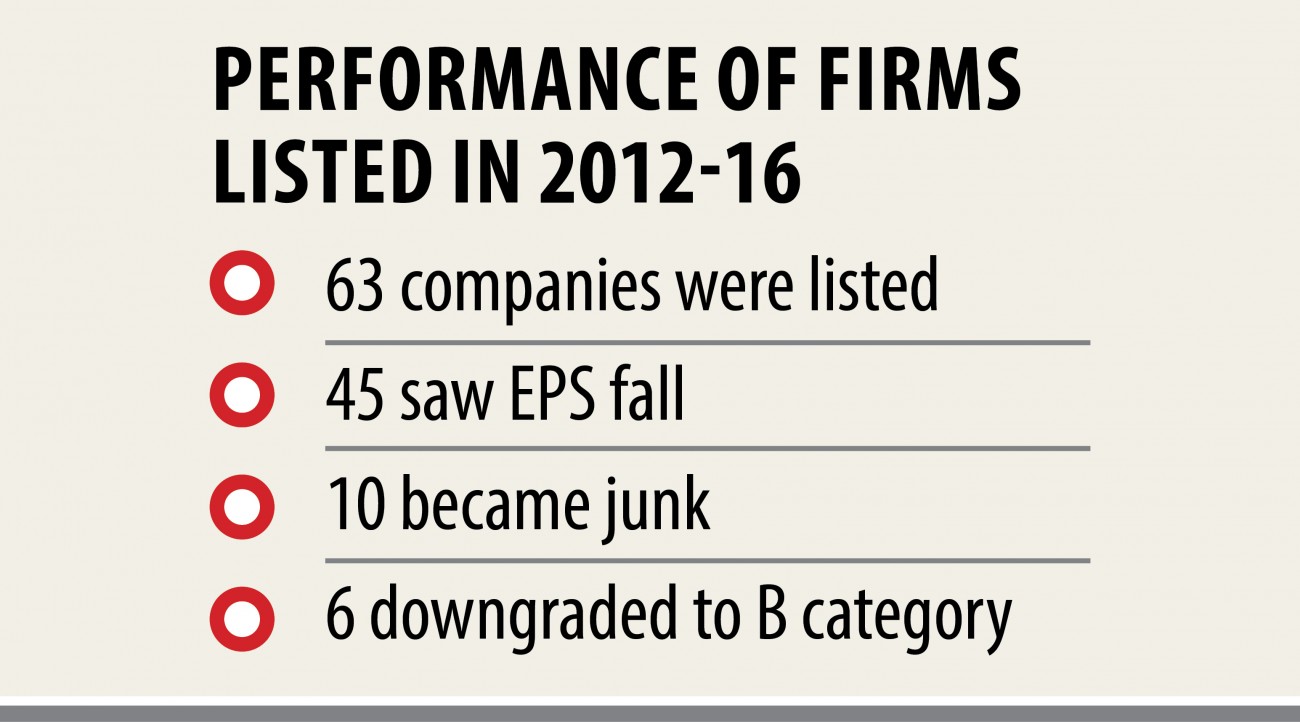Pre- and post-IPO earnings raise questions

Earnings of many companies drop even after three-four years of their listing in the bourses, whereas stock investors expect it will rise with the investment of the proceeds from the initial public offering.
Once their earnings slide, their stock price follow suit, leaving a hole in the stock investors’ portfolio.
Between 2012 and 2016, 63 companies withdrew capital from the stock market to go for further investment and loan repayment -- with the promise that their earnings will rise.
Of them, earnings of 45 companies fell, 17 rose and one has been merged with another listed company and so its data was not available.
The data of companies that raised funds between 2017 and 2019 have not been considered for comparison as a company generally needs two to three years to make profit from an investment.
“It’s a good finding that investors suffer with newly listed companies,” said Abu Ahmed, a stock market analyst.
Most of the companies come to the market and show higher earnings per share (EPS) until the sponsors keep their stake. Once they sell off their shares EPS starts to fall.
“This clearly shows a form of cheating with the shareholders, so the stock market regulator should be tough with them,” he said, adding that the issue manager should be rewarded or punished for bringing a stock.
Market analysts said most of the companies deliberately show higher earnings per share before getting listed.
The reality of their income situation comes to the fore once they get enlisted.
What is more, some companies come to the market when the sponsors think the business is sinking.
After completion of listing, such companies’ earnings go down slowly and move towards the junk stock’s status.
One such example is Tung Hai Knitting and C&A Textiles, both of which got listed in 2014 and 2015 respectively.
Within four years of their listing, both the companies closed their factories and the Dhaka bourse could not find any official at their office addresses.
So, the stocks’ prices came crashing down to Tk 2.90 and 2.50 respectively while their face value was Tk 10. As a result, investors lost huge sums by investing in them.
An email has been sent to the official mails of C&A Textiles and Tung Hai Knitting to know the reasons behind their earnings slump, but they are yet to answer.
A merchant banker acknowledged that the issue managers keep abreast of the potential of a company, so they should be punished for bringing badly performing companies to the market.
“However, the regulator is very strict with some issue managers but not for all,” said the merchant banker preferring anonymity.
Stock investors should also be careful about investing in newly listed companies, but they run towards them as soon as they come to the market, he added.
A top official of the Bangladesh Securities and Exchange Commission (BSEC) said they are following disclosure-based IPO, which ensures that companies will reveal all their data.
“It is the responsibility of the auditor and issue manager to check the veracity of the data.”
The company may fall into losses after getting listed and the BSEC can do nothing about that, he added.
Ahmed recommended the BSEC take some cases for re-audit to find out whether the sponsors are manipulating and ensuring higher stakes for sponsors.
“When the sponsors sell off their major shares their interest in the company wanes.”
Meanwhile, AB Mirza Azizul Islam, a former chairman of BSEC, yesterday said the real picture of a company’s earnings is not reflected during its IPO.
As a result, prices of the stocks remain high after the listing but start to decline within a few years and even fall below the face value, he said at a meeting with Finance Minister AHM Mustafa Kamal at NEC auditorium in the capital where all stakeholders were present.
To prevent this, BSEC, Financial Reporting Council, and the Institute of Chartered Accountants of Bangladesh should work together, he added.
